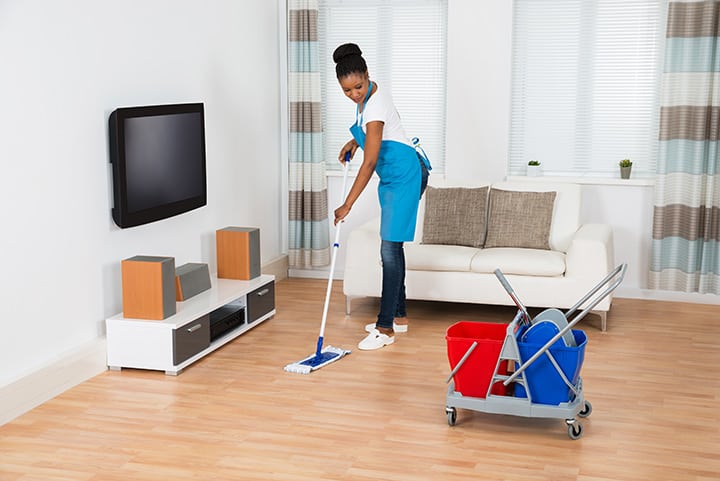
How to start a house cleaning business
The home cleaning industry is subject to change based on household disposable income, but thanks to a large portion of the baby-boomer generation moving into retirement, total industry revenue in 2019 – for franchised residential cleaning services – is projected to hit $943 million, and the annual growth rate from 2014-2019 is 2.8%. If you enjoy cleaning homes and helping others, now is a great time to jump into the house cleaning business.
Free Guide: How To Optimize Your Google Business Profile
Step 1: Create your house cleaning business plan
For the greatest chance of success, you’ll need to begin with a business plan that clearly defines your mission, target market, local competition, startup costs, projected revenue, marketing plan, business structure, and other details. While it’s tempting to jump right in, creating this plan keeps things focused and can even assist you with obtaining startup capital from investors.
Market research helps you determine how viable the business would be in your area. You’ll need to know how many homes are in the area, particularly with individuals or families who can afford to hire your company. How many other house cleaning businesses are in the area? If you’re in an area where franchises dominate the market, you’ll need to find ways to differentiate your company – whether it be in terms of cost, service quality, or even the cleaning products you use.
Determine the service area you’ll cover, including how far you’re willing to travel for a job and the circumstances you’ll willing to work under. Will you work when the clients are home? How will you enter the home if they are not?
For many aspiring business owners, the legal side gets intimidating. You’ll need a legal business formation to maintain professional credibility and satisfy tax obligations. While sole proprietorships are the easiest and least expensive to start, you remain legally liable for debts, lawsuits, etc. LLCs provide an affordable alternative to protect your assets and separate yourself from the business, but it’s in your best interest to consult with a business lawyer to see what’s best for your situation. You must also address local, state, and federal legal requirements, which vary based on where you’ll be operating your business. In some areas, you may be required to obtain a business license and/or business insurance before you can begin signing clients.
During your business planning, you’ll need to consider business accounting. You’ll want to open a separate bank account to handle the finances. It will make it easier to pay any employees you hire, pay your expenses, and prepare for quarterly taxes. Figure your income so you can use this alongside your competitive analysis to set your rates.
Step 2: Figure startup costs for a house cleaning business
One mistake many small business owners make is failing to factor in all business expenses. In terms of the housecleaning business, there’s a low barrier to entry, especially if you already have a reliable vehicle large enough to accommodate all your cleaning equipment and supplies. Typically, you can get started for less than $1,000, excluding fees associated with legally setting up your business.
Potential Startup Costs:
- Vehicle with signage
- Cleaning supplies and tools
- Business insurance to cover damages or breakage of client property and employees on the job
- Company branded t-shirts or hats
- Advertising flyers
- Business cards
- Website (Broadly can help you get started)
- Door hangers to verify service with contact information
Step 3: Boost your business reputation with certification
As a home cleaning professional operating your own business, you’ll obviously need to know how to clean homes. Though no formal education or certification is required to start working in the industry, taking the time to earn certifications can help you command higher rates and build credibility with your potential customers.
The International Executive Housekeepers Association issues certification credentials to housekeepers all across the United States. You can choose between the Certified Executive Housekeeper and the Registered Executive Housekeeper. Before you can start getting either of these certifications, you’ll first need at least one year of verifiable experience working in an entry-level housekeeping position from hotels, business offices, or as an independent contractor.
You must have a Bachelor’s degree from an accredited university for the REH certification, but a high school diploma or GED is all that’s required for the CEH. You’ll be required to complete courses by the IEHA if you which to obtain the REH certification. Then you’ll take a pass an exam to earn a valid certification for three years. Retake the certification exam every three years or provide proof of 30 hours of continuing education over each three year period to maintain your certification.
Step 4: Build trust with a professional appearance
Many homeowners may have had bad experiences with poor quality house cleaning services in the past, which means you must work hard to provide the trust customers need. Even if you’re a brand new business, you can set up a business website with information about your company and services, and include an appointment booking feature. You should also get a business email with your URL (example:katherine@oliviascleaningstlouis.com). And because you won’t be available to answer the phone all the time, you’ll also want a professional voicemail.
Present yourself professionally, with a uniform shirt that features your company name and logo. Place signage on your vehicle. These two things not only increase your professionalism but also help ease neighbor’s concerns about why you’re going into a home while someone isn’t there.
Step 5: Build your customer base
Every business owner wants to increase revenue at some point, but it’s not always easy. Here are five cost-effective strategies you can use to build your reputation, close sales, and establish your online presence without plunging yourself into debt.
1. Increase in sales
Invest in your website and social media. Use your website to chat with potential customers, and rely on social media to bring you leads and help you earn new clients. Post photos of homes before and after you’ve finished cleaning and share customer stories.
Go beyond cleaning homes and start selling cleaning supplies to people who want to clean themselves between your professional services.
2. Focus on building word of mouth
Great customer service needs to be a top priority because people will share their experiences with people they know. Remind customers of your business survives because of reviews and referrals. Use reputation management to keep a competitive advantage. Be friendly and cooperative with neighbors. Hang flyers and hand out business cards to build familiarity with your business name. Connect with apartment communities to create a steady stream of move out cleanings. Listen to customer feedback, and use it to adjust your business accordingly.
3. Rely on online marketing
After you’ve finished your website, claim your Google My Business listing. Though it may not seem worth it, add your business to Google Maps. Some people will search “home cleaning company near me” and your best chance at getting that business is showing up in the local businesses results.
Start a Facebook Business Page and a linked Instagram account. Fill them with photos of sparkling clean homes, tips to keep your home clean between professional visits, and general information about the benefits of a clean and tidy environment.
4. Decrease expenses
Research costs on a regular basis. Look for ways to save money by buying your supplies in bulk, whether it’s through a dedicated cleaning supply store in your area or a wholesale club. Even if you’re getting the best deal you can find right now, doesn’t mean you won’t find a better one later. When you grow, you may be able to leverage greater savings with larger purchases.
5. Choose a specialty area
Because many of the home cleaning products on the market today are made with potentially hazardous ingredients, it’s worth learning about environmentally-friendly alternatives. Some customers may not want to rely on the harshness of bleach or ammonia. Providing all-natural cleaning is one way you’ll be able to compete.
If you want to go even further to separate yourself from the competition, you can specialize in cleaning that reduces allergens or offer add-on services such as laundry, organization, or deep cleaning options in addition to your standard clean.
You may also choose to specialize in certain types of home cleaning services, like window cleaning or carpet cleaning.
Setting the stage for future growth
As your business grows, develop a plan for scaling without compromising customer service or service quality. When you’re ready to hire employees for your cleaning business, build a training system for new crew members that includes how to interact with customers and neighbors. Include bonuses for generating new sales so that your cleaning crews double as your sales team. Add new vehicles and equipment to expand your service area.
Starting small
If you’re not ready to go full-time with home cleaning jobs, this is a wonderful part-time business that scales well as you are able to handle it. Even if you don’t live in a particularly affluent area, you can still be successful.
Transform your local business with revolutionary AI-powered software


